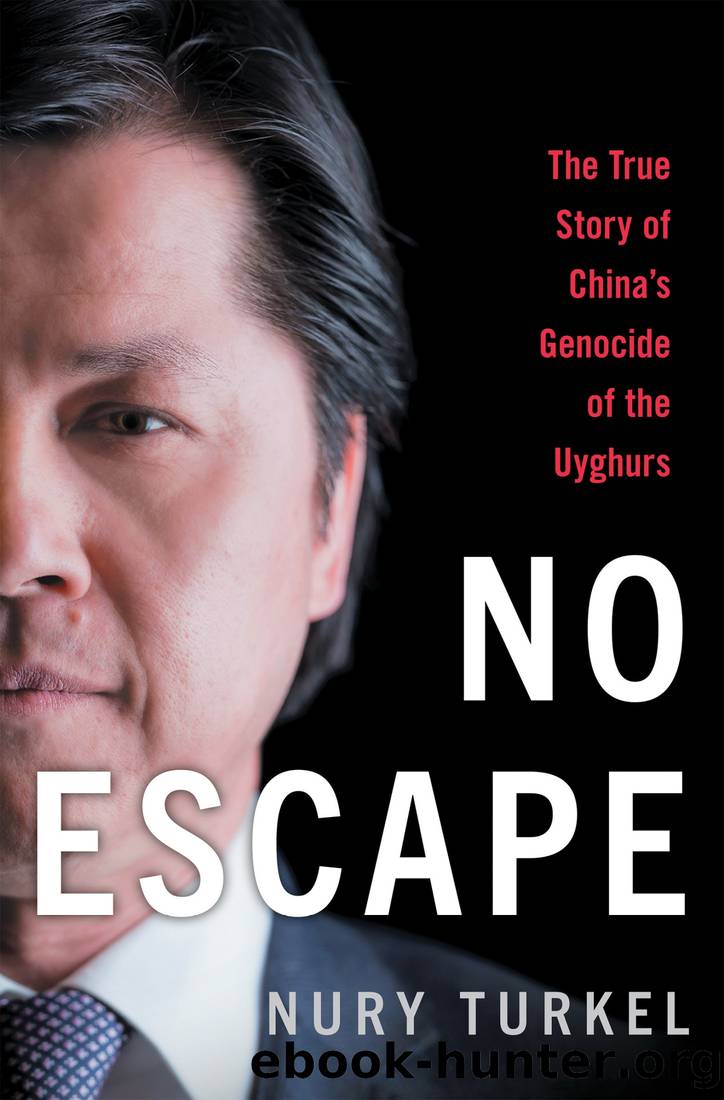No Escape by Nury Turkel

Author:Nury Turkel [Turkel, Nury]
Language: eng
Format: epub
Published: 2022-03-03T19:58:20+00:00
PART 4
HOW TO DELETE A CULTURE
18
In May 2017, two years before Zumrat was forced to flee her homeland and as Ãrümchi was just heading into the abyss, she had received a disturbing notice from the local authorities. She was told that the Muslim cemetery where her brother Mutallip was buriedâthe same one whose unborn baby had been subjected to an extreme late-term abortion after Mutallip died in a car crashâwas being bulldozed for redevelopment. The family had to come and collect his remains, as well as the bones of Zumratâs grandfather, who was buried in the same plot.
When the family arrived at the Feng Tian cemetery near Ãrümchiâs Diwopu International Airport, they were ordered to wait until officials summoned them to witness the exhumation. Then they watched as men in white overalls and hard hats opened the graves with picks, before shoveling the mortal remains into canvas bundles.
They tried to pack the bundles as tightly as possible: Zumrat could hear bones cracking as her relativesâ remains were crushed in. The family were then told to take the cloth-wrapped remains home and keep them there until they received instructions as to where they could be reburied. The only advice they received was to keep the bundles well covered âso that cats donât chew on them.â As they left the cemetery, Zumrat spotted a truck being loaded with identical bundles that had not been claimed by relatives.
Clearly, the family had no place to keep human remains at home, so they wrapped them in plastic and stored them on the roof. Some neighbors kept their dead relatives in the basement, where people also kept sacks of vegetables.
âIt was horrifying to think that there are dead bodies upstairs,â Zumrat told me. âWhenever you heard a noise at night, it felt like they are tapping on the roof, saying, âWhy am I here when I should be in the earth?â Itâs strange beyond words, a nightmare.â
It was almost two weeks before the authorities informed her that a new cemetery had been constructed on the edge of the city, in an arid patch of wasteland known as Liu Daowan. Unlike the leafy cemetery where her brother and grandfather had originally been buried under headstones marked with Koranic inscriptions, this was a barren no-manâs land. The remains were put into small concrete vaults, stacked up in rows. Worse, the individual vaults were not marked: people knew the area where their relatives were buried, but not which tomb to pray over. They were given just ten minutes to say their goodbyes. When they left, they saw facial recognition cameras had been set up at the cemetery gatesâanyone who visited regularly could be suspected of trying to recite Koranic prayers or observe other religious rites, a âcrimeâ which could land them in the camps.
Expanding cities are often forced to relocate cemeteries and move graves, though usually with more respect for the dead than the authorities of Ãrümchi showed. But what happened to Zumratâs family soon turned out to be part of something far more systematic and disturbing.
Download
This site does not store any files on its server. We only index and link to content provided by other sites. Please contact the content providers to delete copyright contents if any and email us, we'll remove relevant links or contents immediately.
| Civil Rights | Discrimination |
| General | Human Rights |
Day by Elie Wiesel(2773)
The Age of Genius by A. C. Grayling(2570)
Gideon's Spies: The Secret History of the Mossad by Gordon Thomas(2329)
The Gulag Archipelago (Vintage Classics) by Aleksandr Solzhenitsyn(2078)
FATWA: Hunted in America by Pamela Geller(1993)
Columbine by Dave Cullen(1858)
Men Explain Things to Me by Rebecca Solnit(1713)
The Rule of Law by Bingham Tom(1679)
Anatomy of Injustice by Raymond Bonner(1652)
Examples & Explanations: Administrative Law by William F. Funk & Richard H. Seamon(1629)
Three Cups of Tea by Greg Mortenson(1606)
The Source by James A. Michener(1594)
That Every Man Be Armed by Stephen P. Halbrook(1574)
ADHD on Trial by Michael Gordon(1566)
Future Design by Unknown(1562)
Gideon's Spies by Gordon Thomas(1496)
Palestinian Walks by Raja Shehadeh(1490)
Constitutional Theory by Carl Schmitt(1443)
Nothing to Envy by Barbara Demick(1436)
